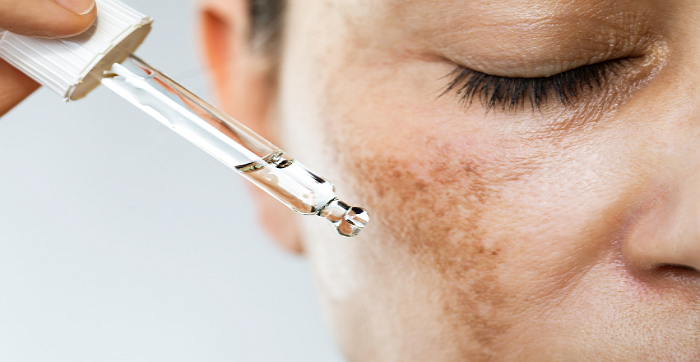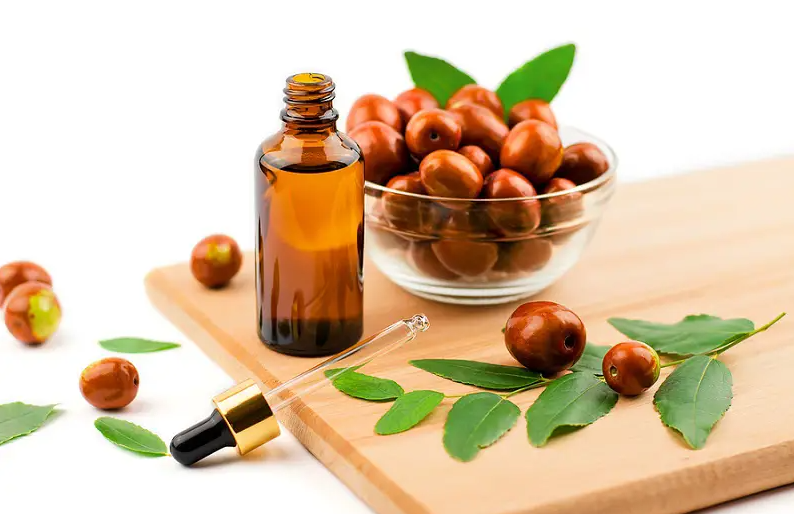Have you tried using jojoba oil for hyperpigmentation? Hyperpigmentation is an unnatural darkening of the skin that can result from acne, overexposure to the sun, or hormonal changes. Although not usually harmful, this skin discoloration can be very frustrating, so people seek out ways to correct it.
You might have heard that you could use jojoba oil for skin whitening or lightening. But is this true? What properties does jojoba oil contain that would make it helpful against hyperpigmentation? Does the lightning of dark spots really correlate with the use of jojoba oil?
Below, I cover all the answers to these questions and everything else you need to know about using jojoba oil for hyperpigmentation.
What Is Jojoba Oil?
Jojoba oil is a wax ester that has an oil-like texture. It is derived from the seeds of a shrub that grows natively in Northern Mexico, Arizona, and California. Half of the seed consists of this wax, so it is quite simple to extract the oil to use it.
Jojoba “oil” – as it’s referred to – is very popular in the health and beauty industries because it’s rich in vitamins and nutrients like vitamin E which can help the skin to heal more quickly and can keep skin looking healthy for longer.
However, jojoba oil is not really an oil, but a wax ester. Wax esters make up the majority of sebum, the oil that your skin naturally creates. This means that jojoba oil is the product that most closely resembles your skin’s natural make-up.
It is also rich in fatty acids such as palmitic acid and oleic acid, among others. These fatty acids are very effective in treating inflammation in the skin which can cause irritation and unsightly blemishes on the skin.
Jojoba oil is an emollient, meaning that it locks moisture into the skin, keeping the skin adequately hydrated. This can help keep the skin healthier as well as reduce irritation and itchiness while making the skin look better.
People love using jojoba oil for their skin because it is effective at treating and preventing acne, preventing and treating scars and wounds, treating eczema and psoriasis, treating dandruff, preventing wrinkles, and treating sunburns.
It works better for your skin than many other traditional oils because it mimics the natural oil produced by your skin. It is less greasy, has a lighter feel on the skin, and does not go bad as quickly.
Click here to buy jojoba oil now.
What is Hyperpigmentation?

Hyperpigmentation simply refers to extra pigmentation in the skin which can make the skin appear darker. It is the result of extra melanin production in areas of the skin. It is not a disease and is not usually considered harmful, although it can make people feel self-conscious about their skin.
Although hyperpigmentation is not a disease itself and does not usually cause problems, it can still be concerning because it is often a symptom of an underlying medical condition.
However, just because you have hyperpigmentation does not mean that there is something seriously wrong with your body. It is a very common condition that is usually caused by inflammation in the skin or overexposure to the sun.
People who develop hyperpigmentation generally notice it in smaller patches across their body, although it can cover larger areas as well. In rarer cases, hyperpigmentation may affect the entire body.
There are multiple types of hyperpigmentation that can be a result of different things. The most common forms are melasma, sunspots, and post-inflammatory hyperpigmentation.
Melasma is very common during pregnancy and is believed to be a result of hormone changes. You will most likely notice color changes on your stomach or face, although they may appear anywhere on the body.
Sunspots, as the name implies, are a result of too much-unprotected exposure to the sun. They are very common and will appear on the areas of your body most often exposed to the sun such as your face, arms, or hands.
Post-inflammatory hyperpigmentation is a symptom of inflammation or an injury caused to the skin. This type of hyperpigmentation is very common in people who deal with acne.
Does It Work To Use Jojoba Oil For Pigmentation?
If hyperpigmentation refers to the extra production of pigment in the skin, then pigmentation simply refers to the natural levels of melanin in your skin. Although hyperpigmentation is not usually concerning, it does cause some people to feel self-conscious about their bodies.
If this is your case, you’re probably wondering whether jojoba oil can help reduce hyperpigmentation.
Do Essential Oils Work For Hyperpigmentation?
It is believed that essential oils have the necessary properties to help reduce hyperpigmentation.
Tyrosinase is an enzyme that controls the production of melanin in the body, so if too much tyrosinase is produced, you will begin to develop hyperpigmentation. Essential oils work to prevent tyrosinase from producing extra melanin.
Essential oils also work as a type of sunscreen because they can absorb the ultraviolet rays produced by the sun. Remember, excess sun exposure is the main cause of hyperpigmentation, so any protection you can offer your skin from the sun will help reduce your chances of developing discoloration.
Some of the best essential oils to use for reducing hyperpigmentation include lemon oil, carrot seed oil, sandalwood oil, geranium oil, tea tree oil, and evening primrose oil.
However, there have been no studies completed to suggest that essential oils can help with hyperpigmentation. These findings are based mostly on anecdotal evidence from people who have noticed an improvement in their hyperpigmentation after using essential oils.
Likewise, there is no specific timeframe for how quickly essential oils may lighten your hyperpigmentation. Based on the findings of previous users, it’s likely that you may not notice results for several weeks, or even months.
Jojoba Oil
Now, to prevent irritation, essential oils must be used with carrier oil. Some carrier oils work better for preventing hyperpigmentation than others, such as jojoba oil. For starters, jojoba oil has anti-inflammatory properties that can prevent or reduce the occurrence of post-inflammatory hyperpigmentation.
Jojoba oil also works well at preventing hyperpigmentation simply because it keeps your skin healthy. Jojoba oil moisturizes your skin and fills it with vitamins and minerals. When your skin is healthy, the dead skin cells will frequently be replaced by new skin cells which prevent hyperpigmentation.
Although there is no specific evidence showing that jojoba oil can reduce hyperpigmentation, it’s likely that it can prevent hyperpigmentation simply by keeping your skin healthy.
Jojoba oil is rich in vitamin E which promotes skin health and the production of new skin cells. Vitamin E in combination with other antioxidants in jojoba oil also acts as a protectant against the sun — the main cause of hyperpigmentation.
Click here to buy jojoba oil now.
Can You Use Jojoba Oil For Skin Lightening?
So, the bottom line is — can jojoba oil help with hyperpigmentation and lighten skin? The answer is that there is no clear evidence to prove that it does. Rather, it likely helps reduce and prevent hyperpigmentation simply by keeping your skin healthy.
However, plenty of anecdotal evidence shows that those who have used jojoba oil for prolonged periods have noticed the lightening of dark spots and the brightening of the skin.
Using Jojoba Oil For Hyperpigmentation

Jojoba oil is most likely to prevent hyperpigmentation by keeping your skin healthy. You may notice results by using jojoba oil alone, but it is likely to work much better if you use it in combination with essential oils.
The essential oils are what have the properties truly seen to produce skin lightening.
Click here to buy jojoba oil now.
Jojoba Oil Hyperpigmentation Serum
Ingredients:
1 tablespoon Jojoba Oil
4-5 drops Rosehip Oil
3-4 drops of Lavender Essential Oil
2-3 drops of Frankincense Essential Oil
Instructions:
Mix the Oils: In a small glass dropper bottle, combine 1 tablespoon of Jojoba Oil with 4-5 drops of Rosehip Oil. Jojoba Oil acts as the carrier oil, while Rosehip Oil is rich in antioxidants and vitamins that can help with hyperpigmentation.
Add Essential Oils: Add 3-4 drops of Lavender Essential Oil and 2-3 drops of Frankincense Essential Oil to the blend. These essential oils are known for their skin rejuvenating properties and can help with skin tone.
Blend Well: Gently shake the bottle to mix all the oils thoroughly.
Application: After cleansing your face, take a few drops of the serum and gently massage it onto the areas of hyperpigmentation. You can use this serum in your evening skincare routine, allowing your skin to absorb the beneficial ingredients overnight.
Sun Protection: During the day, make sure to apply sunscreen with a high SPF to protect your skin from further sun damage, which can worsen hyperpigmentation.
FAQs
Can Jojoba oil really help with hyperpigmentation?
Yes, Jojoba oil is rich in antioxidants and vitamins that can assist in fading hyperpigmentation and promoting a more even skin tone over time.
Are there any side effects of using Jojoba oil for hyperpigmentation?
Jojoba oil is generally safe for most skin types, but it’s advisable to do a test before applying it to your face to check for any adverse reactions. If irritation occurs, discontinue use.
How long does it take to see results when using Jojoba oil for hyperpigmentation?
Results vary from person to person. Consistent use over several weeks to months is typically needed to notice improvements in hyperpigmentation.
Can Jojoba oil replace other treatments for hyperpigmentation?
Jojoba oil can be a natural complement to other treatments, but it might not replace medically prescribed treatments. Consult a dermatologist for personalized advice.
Should I use Jojoba oil in the morning or night for hyperpigmentation?
You can use Jojoba oil both in the morning and at night. Consider using it in your nighttime skincare routine to allow the oil to absorb and work its magic while you sleep.
Is sunscreen important when using Jojoba oil for hyperpigmentation?
Absolutely. Sunscreen is crucial when dealing with hyperpigmentation, as sun exposure can worsen the condition. Always apply broad-spectrum sunscreen before going outside.
Conclusion
If you use jojoba oil regularly for a long period of time, it’s likely that you’ll notice a reduction in the hyperpigmentation of the skin. This is not really because jojoba oil lightens the skin, but because it keeps the skin healthy and promotes new growth of skin cells.
If you really want to reduce your hyperpigmentation, jojoba oil may be helpful but just know that you won’t see results for at least several weeks. If you’d really like to improve your hyperpigmentation, I suggest mixing your jojoba oil with a bit of essential oil.
Know exactly how to store jojoba oil here, if it clogs pores or not here, how to use it for tattoo, scars or wrinkles, which between castor oil or jojoba oil is best here or check out more jojoba oil guides here.

![Can You Use Jojoba Oil For Hyperpigmentation? [Full Guide For Best Results] jojoba oil](https://eatquickhealthy.com/wp-content/uploads/2022/05/jojoba-oil-for-hyperpigmentation-768x497.png)

Comments are closed.